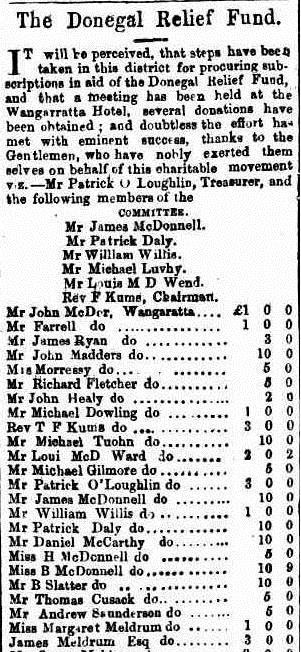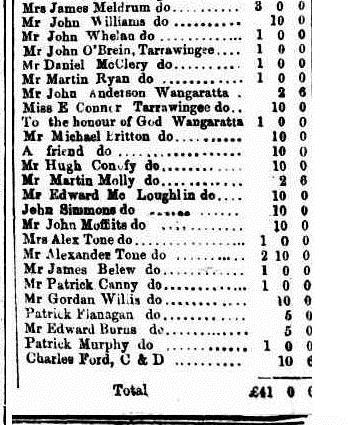Research of our Irish forebears is difficult most of the time. Late civil registration in Ireland, an English, Anglican leaning aristocracy in Australia that thought recording someone as being born in “Ireland” was adequate, excruciatingly common surnames and unimaginative christian names makes for some serious brick walls in Irish research.
I was therefore pleasantly surprised to find this listing of people in Wangaratta who contributed to the Donegal Relief Fund in July 1858.
Did all of these residents have connections with Donegal or were they sympathetic towards their fellow Irishmen? Thomas Cusack, eldest child of Michael Cusack and Mary (nee Hogan) was born in Wangaratta in 1841. Both his parents were born in Tipperary, more than 300 kms south of Donegal. His wife Mary (nee Worcester) was also born in Wangaratta, in 1844, to Buckinghamshire born father Thomas Worcester and Mary (nee Gray) who was born in New South Wales to Irish parents. His contribution must have been sympathetic towards his fellow countrymen. And perhaps, as Thomas was only 17 years old, he was using his father’s money, although Thomas did demonstrate generosity of spirit as he became older and successful in his own right, particularly when he was owner and licensee of the Royal Hotel (now the Pinsent) and then the Council Club Hotel when still in his early twenties.
This listing is also interesting for the evidence of women asserting themselves as having identities separate to those of their husbands, although of course they were known as Mrs [insert husband’s name]. Mrs Alexander Tone is one of those women, although she was careful not to donate more than her husband. Mrs Tone was formerly Margaret Canny. If anyone has researched Patrick Canny and can enlighten me on his connection to Margaret Tone and where in Ireland they came from, please use the contact page to get in touch. The case of Miss Margaret Meldrum is a little curious. Probably James Meldrum submitted the donation on behalf of his eight year old daughter.
The presence of other nationalities on the committee also points to a reasonably egalitarian colonial society. Louis Wend and the Reverend F Kums were likely to have been of Prussian or similar descent. In this case shared religion must have been the bond as Reverend Kums was the Roman Catholic parish priest at Wangaratta.
For information on why Donegal needed a relief fund and how many Donegal residents found their way to Australia in the 1850s and 1860s click here for a web page by Lindel Buckley and Bill Spillane.
Look for more Trove Tuesday posts on Pinterest: #TroveTuesday







Thanks for the tip re this site. My 2x great grandfather, Mr Dan McClery Of Tarrawingee is listed. He was from Co Londonderry, but his wife’s family were a little closer to the Derry /Donegal border.
Glad it helped! I find all the social connections of people in the area fascinating and I wonder if these were all members of St Pat’s.
The DRF was a “hot topic” at the time. Anyone with Donegal ancestry could spend happy hours on the site you mention.
I’m still learning how big this was Pauleen. When I wrote this post I knew I was related to a few of the subscribers but now I can count ten. What intrigues me is that the subscribers were mostly from Clare, but I guess it didn’t matter if it was your countrymen.
Thanks for the link to the Donegal Australia page – a very useful resource.